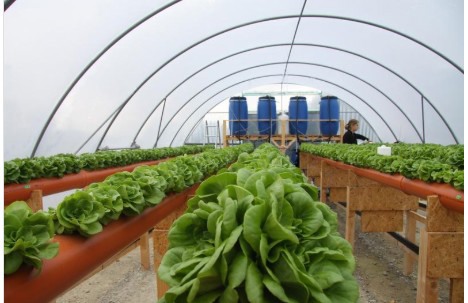Record temperatures and prolonged drought are increasingly affecting agriculture worldwide. In Germany, too, droughts are now jeopardizing a high-yield harvest. A cultivation system with a new type of irrigation technology using treated wastewater is particularly suitable for water-poor regions and selected crops. Results and concrete recommendations for practical application of this alternative form of agriculture with water recycling are now available.
Is it possible to minimize the high water consumption in agricultural crop production by using recycled wastewater? And can valuable nutrients from wastewater be recycled in the cultivation process and used for the production of various vegetables and ornamental plants?
In the research project HypoWave, funded by the Federal Ministry of Education and Research (BMBF), scientists have found a way to combine these two goals. In a greenhouse, the interdisciplinary team cultivated lettuce plants in plant containers without using soil. In this so-called hydroponic process, the plants are supplied with a nutrient solution. Compared to conventional cultivation, no water seeps into the soil and there is much less evaporation. The special feature: For the first time, treated wastewater is used for this hydroponic plant cultivation. It comes from the neighbouring sewage plant and is treated and sanitised in a multi-stage process. At the same time, nutrients necessary for healthy plant growth are extracted from the wastewater. These can be recycled, just like the irrigation water itself.
 View into the greenhouse before the second complete lettuce harvest
View into the greenhouse before the second complete lettuce harvest
Picture: ISOE
Win-win situation for agriculture and wastewater companies
"What is special about the bottomless hydroponic crop cultivation in our pilot plant is that we were able to successfully optimize the already water-saving process by using specially treated wastewater," says project manager Thomas Dockhorn from the Technical University of Braunschweig. The use of the treated wastewater not only opens up a previously unused water source, he says. The plants in the HypoWave concept are also suitable for more extensive wastewater treatment because they absorb nitrogen and phosphorus. This results in optimal plant growth with a good nutrient supply and at the same time the water is purified by this nutrient removal. "The pilot project on the site of the Hattorf wastewater treatment plant near Wolfsburg showed us that the HypoWave process can be a win-win situation for agriculture and wastewater disposal companies due to its sustainability and resource efficiency," says Dockhorn.
Regional food production despite water shortage
The HypoWave process is particularly suitable for growing vegetables such as cucumbers, tomatoes, peppers or lettuce. A possible application site in Germany is rural areas with regional water shortages and sewage treatment plants without significant industrial discharge. Here the process can contribute to year-round regional vegetable production. However, it is also interesting for cultivation in regions chronically affected by water shortages, such as Spain or Portugal. "Agricultural companies with an interest in innovation are now in demand for the implementation of the HypoWave process," says project coordinator Martina Winker from ISOE - Institute for Social-Ecological Research. Opportunities to enter into this sustainable plant production would be available in Germany again and again, as wastewater treatment plants are restructuring anyway - for example, because they are introducing the fourth purification stage or have to modify their water infrastructure for other reasons. "This opens up windows of opportunity for cooperation between farmers and wastewater companies."
Risk management for successful cultivation
The most important prerequisite for successful cultivation and a high-yield harvest is comprehensive risk management, he said. "Farmers ask themselves whether there is a risk associated with cultivation," observes Thomas Dockhorn. "That's why we already recommend that when choosing a wastewater treatment plant, we make sure that it is municipal wastewater without major industrial discharge, so that no problematic heavy metal concentrations occur. In addition, the microbiological quality of irrigation water and products was examined in the project. It became clear that no increased contamination due to the origin of the water could be detected. Overall, however, the project recommends a multi-stage risk management, starting with industrial hygiene and occupational safety and including additional elements such as UV irradiation of the irrigation water and strict separation of the water and plant spheres.
Landscape concept for sustainable implementation of the HypoWave process
Two further sustainability aspects that should be taken into account in principle when growing in greenhouses were investigated in the project: "We investigated the fact that production in the greenhouse can disturb the landscape and that the 'isolation' from nature through cultivation under glass or foil can have consequences for ecosystems," says Martina Winker. "It is therefore important that such systems are integrated into landscape design concepts and  corresponding compensatory measures are involved." The project therefore also developed recommendations on how the HypoWave concept can be embedded in the landscape both aesthetically and with regard to the preservation of sustainable ecosystem services.
corresponding compensatory measures are involved." The project therefore also developed recommendations on how the HypoWave concept can be embedded in the landscape both aesthetically and with regard to the preservation of sustainable ecosystem services.
More information on the project can be found at www.hypowave.de
